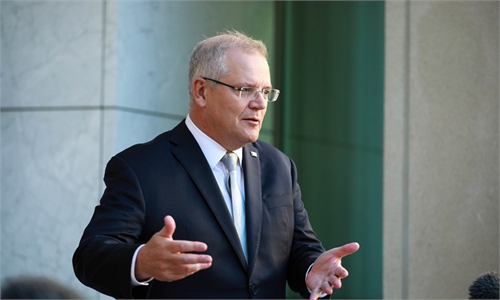With Victoria’s participation of CIIE, Morrison faces more doubts with his China trade policy

Australian State Premier of Victoria Daniel Andrews. Photo: Xinhua
Australia's Victorian Premier Daniel Andrews had reportedly paid dozens of companies from the state to attend the fourth China International Import Expo (CIIE) in Shanghai, which kicked off on Thursday. This Victorian governmental move goes against federal wishes. The Daily Mail described it as Andrews breaking ranks with Australia Prime Minister Scott Morrison's policy toward Beijing "for a second time." The first transpired when Morrison tore up Andrews' deal with the China-initiated Belt and Road Initiative in April.The Australian newspaper published an article entitled "Andrews and Morrison part ways again over China trade." With deteriorating bilateral ties, Canberra has interpreted China's normal trade practices as "economic coercion." In this context, the Morrison government intends to diversify Australia's trade relationship away from China to reduce its reliance on the country.
However, the Victorian government still sees the Chinese market as a crucial priority and is keen to develop its trade relationship with China. This must irk Morrison. The Morrison administration now seems to politicize all China-related issues, and handle some of the foreign trade and economic ties of local governments with political thinking.
Morrison has stressed that Australia's local governments should "speak with one voice and work to one plan" when it comes to "Australia's dealings with the rest of the world." Australian Federal Trade Minister Dan Tehan also said that the federal government wants a "whole of nation" approach to dealings with China, and Australian government and business should be working together.
This requirement is irrational and unfeasible. State governments have the right to seek out more opportunities for local businesses, and federal intervention is unwarranted and unjustified.
China-Australia economic and trade relations are beneficial to both sides. However, the Morrison government has taken very irrational behavior in its China policy, leading to the deterioration of China-Australia relations, including economic and trade cooperation. The exports and employment of various states have also been seriously affected. Morrison has asked all states to cooperate with his China policy, which is in fact kidnapping these states.
All states have benefited from the close economic and trade relations with China. Many have complained about the Morrison government's China policy. For example, Western Australia Premier Mark McGowan warned in June that Australia could be the "big loser" if Morrison is not more careful in the way he refers to China. Just like Victoria, Western Australia will never want to be tied onto the chariot of the Morrison government's anti-China policy and lose local employment and corporate interests.
If the Australian federal government wants each state government to actively cooperate with its China policy, it must formulate a policy that is in line with the country's fundamental and long-term interests. If not, local governments have no reason to coordinate. At present, the Morrison government is constantly taking China as a threat and rival, cooperating with the US to suppress China and interfere in China's internal affairs. This strategy is definitely wrong. It is not unusual for states to disagree with the federal government.
Victoria's practice is expected to have a demonstration effect in other states and it will resonate with Western Australia for sure. When other states see Victoria State getting substantial benefits for its local products by attending the CIIE, they are likely to follow suit. The importance of the Chinese market is well known to all Australian states. In the context of the COVID-19 pandemic, Australia's economic situation is not very optimistic. All states now face the hard task of economic recovery. Increasing exports to China is certainly a useful means to achieve this need.
Clearly, Australian companies are facing some obstacles in developing trade relations with China as a result of the current deterioration in bilateral relations. As has been widely reported, US exports to China of wine, cotton, log timber and wood have increased over the past year as Australia exports on the same products declined. This fact will make Australian businesses even more dissatisfied.
Victoria's approach, and the demonstration effect it may have, will certainly put the federal government under pressure. The Morrison government will face more doubts with its trade policy toward China. It is also time for the Australian government to review its relations with China. After all, improving the well-being of Australians and safeguarding the interests of Australian businesses should be its primary considerations.
The author is an assistant research fellow at the China Institute of International Studies. opinion@globaltimes.com.cn

